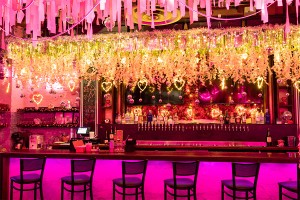Philly Jazz Master Henry Grimes Honors Cecil Taylor at Painted Bride
Philly free jazz great Henry Grimes returns to town tomorrow to perform in Celebrating Cecil at the Painted Bride. The event recognizes the innovative work of jazz pioneer Cecil Taylor at the Painted Bride. Both musicians were at the forefront of ’60s avant-garde, re-constructing jazz alongside Pharaoh Sanders, Albert Ayler and Don Cherry.
Grimes has had an incredible life and career, neither of which he shies from talking about. He grew up in Philadelphia, attended Juilliard, where he strayed from the curriculum and started hobnobbing with Sanders, Ayler and Taylor, to make music that turned conventional jazz on its ear. After a long disappearance from music and the public eye, Grimes returned in 2002, with a new outlook, new outlets (Grimes now works on violin and poetry in addition to his renowned double bass) and, even at 78, plenty of new output. Grimes talks Philadelphia, 50 years of music, and why this generation may not be so bad.
Growing up Philly: When I was a youngster growing up in Philadelphia, there were a lot of young musicians in a fever of studying and playing and writing and listening to music, and we all inspired one another and drove each other on to new heights. And the schools offered a lot of enlightening programs that were good for students and professionals. There were musical instruments placed in the hands of young students, and instruction and encouragement came with them. These days a lot of kids have never even seen a musical instrument, except on YouTube. It’s really sad.
On Cecil Taylor: Cecil is one of the greatest masters on the scene -— on any scene, as far as I’m concerned. When musicians of this caliber come together in a program like this [Celebrating Cecil], it’s great to discover and share our ways of honoring Cecil Taylor. My relationships with [other free jazz greats] mean the world to me. In my younger years I never felt such a sense of respect and support from the musicians I admired. They are my family now.
On liberating jazz: First, I always had a love of freedom. But it happened because of Cecil Taylor, who came to see me in the early ’60s or late ’50s when I was playing with Buddy Rich’s band. Afterwards Cecil said that he heard glimpses of something new in my playing, and he and some other musician friends were working together to create new music, and he wanted me to come with them. So I did.
On what inspires him now: 1. Going through a musical enlightenment with my own music, being able to play it for the people and have my fellow musicians play it with me. 2. Also hearing a lot of great young musicians coming into their own, which is always a reason to believe. 3. Having a new understanding that I have a part in the community of musicians who have welcomed my return and want to work with me. 4. Waking up each day to new concerts coming up (such as the one on Saturday at the Painted Bride), new collaborations, new CD releases, new hopes and possibilities. 4. Having an apartment home in New York City and a beautiful personal life.
On his next projects: So many! Next month I’ll be giving a solo performance (bass, violin, poetry) in Toronto in celebration of one of my new CDs, The Tone of Wonder, played solo in Switzerland last spring. In May a master class at
The New School in New York City, and then a quartet tour in Europe with Cornelia Mueller, Marshall Allen (leader of the Sun Ra Arkestra), and Avreeayl Ra (I also have another new CD with Marshall coming out on Scott Robinson’s ScienSonic label sometime soon, maybe in time for the tour). In June there’s a date with Marc Ribot and Chad Taylor at SF Jazz in San
Francisco, then two dates in Sao Paulo, Brazil with High Priest / HPrizm of Anti-pop Consortium, and then a date in the Vision Festival with Connie Crothers and Melvin Gibbs. And on we go…
On the old and new: I think what is called “free jazz” is an honored tradition in our music now, after many trials and tribulations, but in reality it is neither free nor necessarily jazz any more. Many changes and developments have taken place in all directions. New days herald new young people to the fore to work for the art that is being born now, in music, literature, painting, theater — in life, giving us new understandings. We have very young challenges in music, newer than the things we all knew and learned when we were coming up. And the nature of the music called “jazz” is change. I do feel that many of the young musicians today have been over-conservatory-educated to the point where many of them sound the same, or the same as [name your jazz star from the ’50s and ’60s], or are trying to be them, and these youngsters have to break free of imitation if anything is ever to become of them, and if the music is going to survive.
Grimes plays the Painted Bride, Saturday March 8th, in Celebrating Cecil Taylor at 8 p.m. For upcoming shows an inquiries, Grimes encourages fans and new listeners to stay in touch, via his website, facebook or email.


